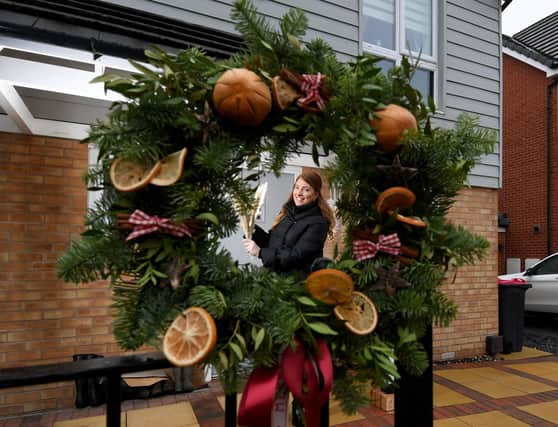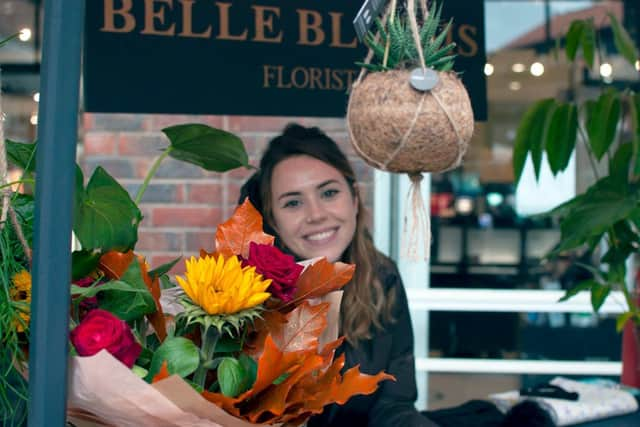Lockdown in bloom: How florists have adapted to pandemic demand for flowers


As an independent florist, Carole Wickham (of Wickham & Taylor, Barnsley) has arranged flowers for all manner of joyful occasions, from weddings to birthdays and baby showers. Yet it’s funerals, says Carole, that have been her most memorable work:
“I don’t do a lot of funerals, but I do get some [work] and I love being able to do the very last thing for someone in their life...I feel so privileged that people ask me to do that - giving someone a special final send-off”.
Advertisement
Hide AdAdvertisement
Hide AdIt’s a sentiment that speaks to the ubiquity of flowers - and florists - during the most pivotal and important moments of our lives: dates; engagements; graduations; new jobs; big news and big apologies. As a simple, heartfelt way to communicate with those you care about, it’s perhaps no surprise that 2020 made them more in-demand than ever.


In spite of this demand, and a growing emphasis on supporting local businesses, the pandemic hadn’t all been rosy for independent florists in the region, who have been forced to adapt continually in the face of ever-changing rules and restrictions.
For those like Fay Cartledge, who runs Blossom and Ivy florists from her home in Wakefield, the cancellation of weddings - which her business focused on - has been a huge blow to trade:
“All but one of the weddings I was supposed to do this year were cancelled...the one I did do was scaled back significantly...people just don’t want to spend as much money [on wedding arrangements] especially as fewer people are attending”.
Advertisement
Hide AdAdvertisement
Hide AdShe counts herself “very very fortunate” that she maintains a part-time job outside of floristry; a job Fay says has allowed her to scrape through the year financially.
Though Laura Newby - of Belle Blooms Florist, York - has also seen her wedding commissions evaporate, she did see an explosion in demand for what she calls “thinking of you” bouquets during the first lockdown in March:
“I found that because people couldn’t see their friends and family, they were wanting to send gifts to each other - they came to me for flower [deliveries]... since then those customers have come back to me for other occasions”.
It’s something Fay also saw earlier in 2020, adding that she saw some change in customer enquiries, with people giving her “a lot more time” and being a more “specific” about the arrangements:
Advertisement
Hide AdAdvertisement
Hide Ad“Before, a lot of people would get in touch with a budget and ask you to do something for the following day...now they’re looking for something really special”.
The talent for providing special, bespoke arrangements for each customer is vital for survival as an independent florist, says Laura, who points out that they are in fierce competition with supermarkets, which offer cut-price bouquets.
Laura, who studied Fine Art at university before taking a floristry course at Askham Bryan College in York, uses this background to make her floristry stand out:
“My bouquets are always very colourful...a lot of my floristry is influenced by the abstract art I studied - so I’ll go for bright or contrasting colours...if it is a neutral palette I try to add something different or surprising in there too”.
Advertisement
Hide AdAdvertisement
Hide AdIn a year where people have spent more time indoors than ever before, Laura adds that it’s also key to stay on top of changing trends in interior design: recently, she’s found success selling dried flower bouquets as well as millennial-favourite house plants.
“As awful as the pandemic has been, it’s pushed me in a way”, says Laura, who was offered an outdoor stall with department store Fenwicks in October where she’s now able to sell her wares at a safe distance several days a week.
Carole agrees that 2020 was a year of re-thinking and creativity, with her usual in-person workshops unable to go ahead. Instead, she adapted by offering wreath-making workshops online and selling the materials on Etsy. “I put 40 [kits] on Etsy; within four days they’d all sold out”.
Though Fay did something similar with her workshops, she admits that “it’s not quite the same” as being able to offer classes in person, where she can properly guide attendees and correct mistakes.
Advertisement
Hide AdAdvertisement
Hide AdShe adds, too, that lockdown has “made me realise I wasn’t using social media enough - I realised I need to make the most of it now more than ever”.
Laura, who relies entirely on social media platforms for her business, says Instagram is “one of the most useful tools” for florists to present their bouquets and offer promotions or competitions to customers - especially important during periods when her physical stall has been unable to operate.
These closures, and ever-changing rules, have proved a challenge for all three women, who have had to exercise creativity and flexibility throughout the year.
“Using fresh products has been a worry throughout”, says Laura, thanks to “last-minute changing of the rules” leaving her with very little notice as to whether her stall can or can’t open.
Advertisement
Hide AdAdvertisement
Hide AdEven outside of lockdowns, Laura says that footfall in the city centre has been an issue - with some reluctant to venture out for fear of coronavirus.
Irrespective of the pandemic, however, she adds that floristry has always been “harder work than people give you credit for”. It’s a feeling Fay shares, saying she had “absolutely no idea what hard work went into floristry” prior to her entering the field:
“I’m often exhausted...my hands are so cracked and dry - but it’s a small price to pay for doing something you love”.
In spite of the hard work involved, florists - along with gardeners - are said to be some of the happiest workers in the UK; a fact that neither Fay, Carole or Laura dispute:
Advertisement
Hide AdAdvertisement
Hide Ad“I get a huge amount of satisfaction from my job”, says Carole, who left a job at the NHS to become a florist after a mental breakdown several years ago:
“When you deliver a bouquet of flowers and you see the smile on people’s faces...it’s so lovely”.
“There just aren’t many jobs where you get the same response”, says Fay, who has now been in floristry for around three years.
“It’s very very rare that you get a customer that’s disappointed...the first thing everyone does is smile, thank you and tell you how beautiful it looks - it’s so nice knowing that it’s your work that did that”.
Advertisement
Hide AdAdvertisement
Hide AdWhile Carole has found her most special work to be funeral arrangements, for Laura, it was a birth that generated her most memorable bouquet:
“I got a huge order in from a dad-to-be the day before the baby was due, so I rushed to put together a huge arrangement in a vase and deliver it to the house.
“The couple had already gone to the hospital when I arrived and the next day they came home with their new baby to the arrangement sitting on the doorstep to welcome them.
“A couple of days later he [the father] messaged to thank me and tell me the new baby’s name - it’s moments like that which I really love”.